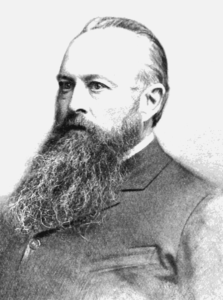For years now I have considered myself “libertarian-ish.” It became clear to me a while back that the increasing size and scope of government is a significant problem in our country; in fact, I believe it’s today’s fundamental political issue. In addition, my study of economics, particularly the Austrian school of economics, bolsters my belief that government should in general be as limited as possible, especially in the economic sphere. So why do I consider myself only “libertarian-ish,” and not a full-fledged, card-carrying libertarian? Because of libertarianism’s misunderstanding of the human person; specifically, libertarianism’s apparent rejection of the doctrine of Original Sin.
Original Sin Impacts Everyone and Everything
Essentially, the doctrine of Original Sin states that we are all disordered – we desire things that are not good for us, and we do things that harm us and those around us. G.K. Chesterton once noted that Original Sin is “the only part of Christian theology which can really be proven.” And proven quite easily, in fact. Simply pull up Google News, watch a 24-hour news channel, or work in an office for a day, and you’ll see Original Sin in all its glory (or shame, more precisely). It doesn’t take much living to see the truth of this doctrine.
Most modern political systems have a blind spot when it comes to Original Sin. Liberals and conservatives appear to believe that Original Sin doesn’t impact certain institutions. For liberals, it’s the government. Somehow, when people become bureaucrats, they leave the bonds of sin and only want what is best for all people. Only a liberal would believe that the government can manage every aspect of people’s lives better than they can themselves. Conservatives have two blind spots: for them, it’s business and the military. Are you the CEO of a corporation? Then you can do no wrong. Are you a general in the U.S. Army? Then we bow to your immaculate decision-making.
Libertarians, on the other hand, are cognizant of the dangers to society associated with anyone in power – whether in government, business, the military, or any institution. Service in certain cherished institutions doesn’t exempt you from Original Sin; in fact, gaining such a position can quickly corrupt a person, and now he or she has the ability to negatively influence the lives of others. Lord Acton famously said, “Power tends to corrupt and absolute power corrupts absolutely. Great men are almost always bad men, even when they exercise influence and not authority; still more when you superadd the tendency of the certainty of corruption by authority.” Open any history book and within three pages you’ll see the truth of this statement.
Libertarianism Has a Blind Spot, Too
Do libertarians have a blind spot? I believe so, and for them, it is individuals. For many libertarians, the fundamental problem is the power, not the disordered individual holding it. However, without Original Sin, someone could hold power without becoming corrupt, and it could be used for the good of others. The ultimate problem is man himself, not man’s institutions. To quote Chesterton again, when asked what is wrong with the world, he answered, “I am.”
As we saw above, Lord Acton observed, “Great men are almost always bad men,” yet I would say he didn’t go far enough. All men can be bad men. Power simply exacerbates the problem, and expands its impact. Libertarians are thus right to try to diminish the exercise of power in our world. But eliminating the exercise of power, paradoxically, will not solve the problem. In fact, authority, properly exercised and constrained, can help keep our disordered tendencies in check.
Most libertarians wish to legalize many things that are currently illegal, like marijuana and other drugs. They argue that the illegality of these things has prevented the birth of a safe free-market for them. As a result, such items have gone underground where corruption is sure to follow.
The implicit assumption here is that the legality/illegality of an activity has no impact on how extensively it’s practiced. This is false. Making something illegal does decrease its use; making something legal does increase its use. Most people follow laws that they personally disagree with, for two reasons: (1) they don’t want to face the consequences of breaking the law; and (2) most people wish to avoid the social stigma associated with breaking the law. Thus, the exercise of authority does succeed at lessening the practice of socially undesirable activities. I know from my own experience that this is true, as I had the opportunity in high school to smoke marijuana but declined due to my fear of getting caught. Had it been legal, I’m sure I would have not hesitated to indulge.
The Enemy of My Enemy is My Friend
So, why does someone who sees this flaw with libertarianism still consider himself “libertarian-ish?” It is mostly a practical consideration. Imagine a scale of government systems where 1 is a completely anarchist society and 10 is a totalitarian state. Currently I would estimate that the United States is around a 7 and moving closer and closer to being a “perfect” 10. Liberals are doing everything in their power to achieve that totalitarian 10, while conservatives appear to be satisfied with the 7, perhaps even wanting to nudge us to an 8, as long as the totalitarians in charge are their totalitarians. In this situation, the simple desire of libertarians to move down the scale instead of up is attractive to me. I might see the ideal government system at a 4, and a full-fledged libertarian might see it at a 2, but in today’s world we can make common cause.
Freedom is necessary for virtue to flourish, but freedom doesn’t cause virtue. Because of Original Sin, we need some structures in place, including governmental structures, to keep us in check. They need to be far less expansive than now, but they should not be abolished. As long as we have an ever-growing State apparatus, I’ll be on the side of the libertarians. If one day we are successful in radically reducing the size of government, then we can debate exactly how small it should be.




